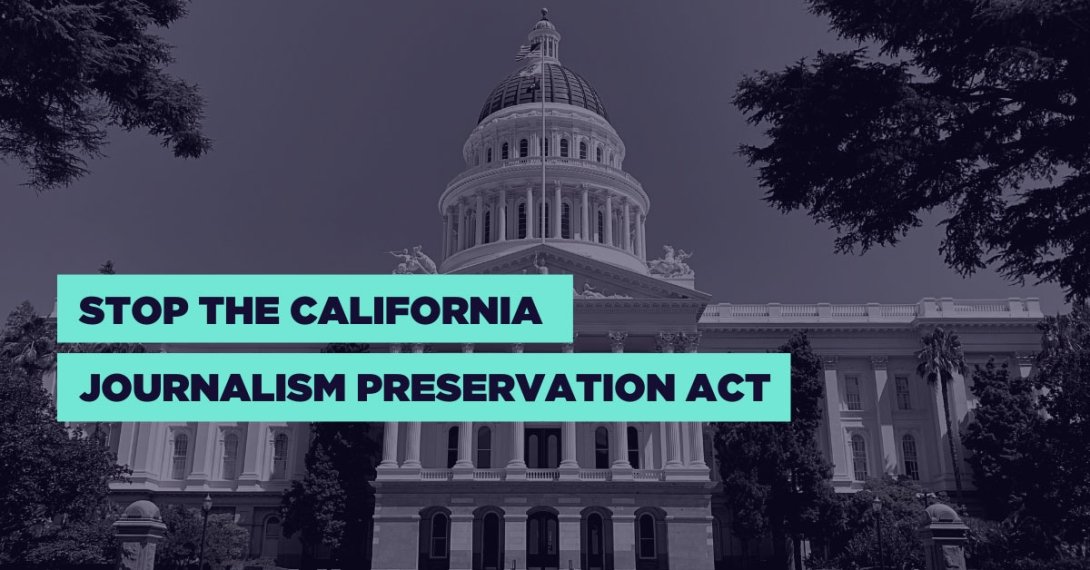Stalled Local-News Bill Opens Door to Something Better in California

Civic news and information — which are essential to a well-functioning democracy — are under threat in California. Since 2004, the state has lost 25 percent of its newspapers and total news circulation has dropped more than 50 percent. The newsrooms that have managed to scrape by are navigating a desolate landscape — one in which corporate consolidation, mismanagement and digital technologies have turned many local-news outlets into shells of their former selves.
Unfortunately, this year state lawmakers responded by pushing an irreparably flawed “solution” to the crisis. They lined up support behind the California Journalism Preservation Act (CJPA), legislation that would harm the local-news ecosystem by incentivizing clickbait and rewarding large media outlets owned by corporations and hedge funds.
Lawmakers put the brakes on fast-moving CJPA
But in a significant win for local-news advocates, the CJPA has been halted — for now. Earlier this month, Assemblymember Buffy Wicks and State Sen. Tom Umberg announced that the legislature would delay further consideration of the legislation until 2024.
The pause comes after journalism advocates across the state sprang into action to oppose the bill. Organizations including Free Press Action put together widely shared petitions and mobilized Californians to place hundreds of calls to their state lawmakers. Independent outlets like Access Humboldt, The Alameda Post, Crosstown LA, El Tímpano and the Times of San Diego called on legislators to pass “policies that would expand public-interest journalism” and urged them to reject the CJPA, which “would exacerbate the spread of online hate and misinformation and make it harder for people to access trustworthy news.”
This organized opposition helped change the narrative around the rapidly advancing bill and showed the power of unified grassroots voices in the policy process.
While these groups have many concerns about the CJPA, one sticks out. At the very heart of the bill is a link tax, a convoluted negotiating mechanism that would allow publishers to extract payments from Big Tech companies that feature links to their stories. Publishers would be rewarded for generating views above all else, a warped incentive system that values quantity over quality.
A better name for the bill would be the Clickbait Journalism Preservation Act, because it would flood California with sensationalist news and disinformation and hasten the decline of local accountability journalism and civic information. The prime beneficiaries of this arrangement would be clickbait farms like the Daily Wire and large media outlets owned by profitable corporations and hedge funds like Sinclair Broadcast Group and Alden Global Capital — the very same industry players that helped create the local-news catastrophe we find ourselves in.
Pause gives advocates a chance to promote better local-news solutions
The delay of the legislation is a win for local journalism in California. But the CJPA isn’t going away. Assm. Wicks has made it clear that passing the bill is still a top priority for 2024, and State Sen. Umberg plans to convene an informational hearing this fall so lawmakers and other interested parties can hammer out additional details before working to advance the bill. More than anything, the delayed consideration gives advocates a chance to catch their breath before continuing to reshape the conversation around local-news solutions.
Simply put, link taxes are a terrible way to combat the local-news crisis. While Wicks and Umberg should be applauded for pausing the bill and seeking more stakeholder input, lawmakers should explore better approaches.
State lawmakers have already shown their interest in solutions that benefit local publishers and community needs. Last year, the state invested $25 million in creating the California Local News Fellowship. Housed at UC Berkeley, the program focuses on strengthening local journalism in underserved communities. Legislators should continue to support the program so it can serve residents for years to come.
There are also excellent models in other states that are worth investigating. In New Jersey, for instance, lawmakers have created the Civic Information Consortium to support local news and information across the state. The consortium has a particular focus on news deserts and marginalized groups that commercial media outlets have historically underserved. Since 2021, the state-funded nonprofit has awarded grants to some 30 organizations focusing on diversifying journalism, improving government transparency, providing community-health news and better serving communities of color and immigrant communities.
Or legislators could tax online advertising — an industry dominated by Google and Meta — to create a state fund or endowment that directs money into the best kinds of local journalism without rewarding clickbait “news” or lining the pockets of already-profitable media conglomerates.
As these alternatives are explored, advocates must keep up their work to engage more Californians about the issue. Proponents of the CJPA have framed the bill as a way to both hold Big Tech companies accountable and put money into the pockets of local journalists. It’s an appealing idea, but the legislation would do a poor job at both: Platforms would barely feel a dent in their profits, and the proceeds from the link tax wouldn’t flow to the outlets that need support the most.
Overall, the hard-won pause to the CJPA is an inflection point for lawmakers in Sacramento: Will they support the kind of local journalism that Californians need to participate in our democracy? Or will they undercut it by supporting policies like the CJPA that reinforce the worst tendencies of today’s media ecosystem?
Their decision will have enormous consequences — not just for the struggling local-news industry, but for the well-being of California’s democratic system as a whole. For the sake of underserved communities across the state, the legislature must get this right.